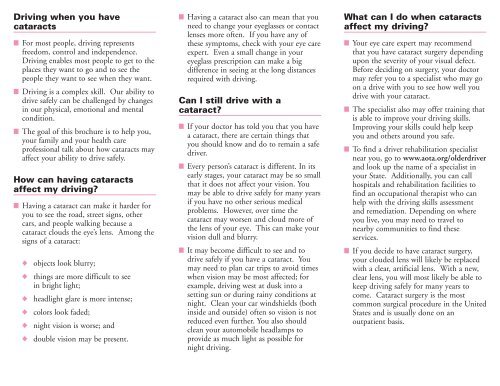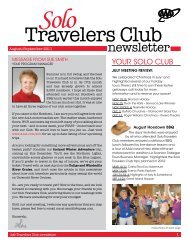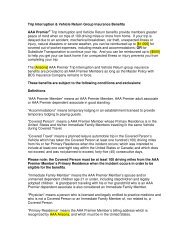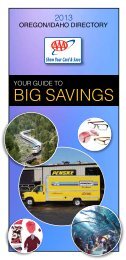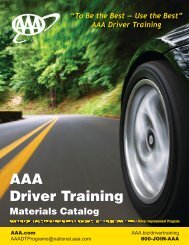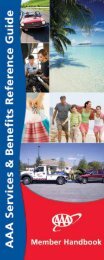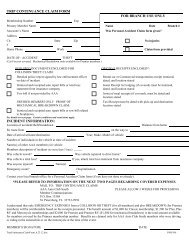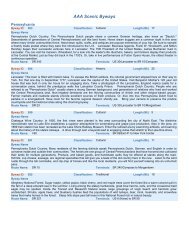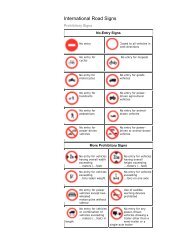Driving when you have cataracts How can having cataracts affect my ...
Driving when you have cataracts How can having cataracts affect my ...
Driving when you have cataracts How can having cataracts affect my ...
You also want an ePaper? Increase the reach of your titles
YUMPU automatically turns print PDFs into web optimized ePapers that Google loves.
<strong>Driving</strong> <strong>when</strong> <strong>you</strong> <strong>have</strong><strong>cataracts</strong>■ For most people, driving representsfreedom, control and independence.<strong>Driving</strong> enables most people to get to theplaces they want to go and to see thepeople they want to see <strong>when</strong> they want.■ <strong>Driving</strong> is a complex skill. Our ability todrive safely <strong>can</strong> be challenged by changesin our physical, emotional and mentalcondition.■ The goal of this brochure is to help <strong>you</strong>,<strong>you</strong>r family and <strong>you</strong>r health careprofessional talk about how <strong>cataracts</strong> may<strong>affect</strong> <strong>you</strong>r ability to drive safely.<strong>How</strong> <strong>can</strong> <strong>having</strong> <strong>cataracts</strong><strong>affect</strong> <strong>my</strong> driving?■ Having a cataract <strong>can</strong> make it harder for<strong>you</strong> to see the road, street signs, othercars, and people walking because acataract clouds the eye’s lens. Among thesigns of a cataract:◆◆◆◆◆◆objects look blurry;things are more difficult to seein bright light;headlight glare is more intense;colors look faded;night vision is worse; anddouble vision may be present.■ Having a cataract also <strong>can</strong> mean that <strong>you</strong>need to change <strong>you</strong>r eyeglasses or contactlenses more often. If <strong>you</strong> <strong>have</strong> any ofthese symptoms, check with <strong>you</strong>r eye careexpert. Even a small change in <strong>you</strong>reyeglass prescription <strong>can</strong> make a bigdifference in seeing at the long distancesrequired with driving.Can I still drive with acataract?■ If <strong>you</strong>r doctor has told <strong>you</strong> that <strong>you</strong> <strong>have</strong>a cataract, there are certain things that<strong>you</strong> should know and do to remain a safedriver.■ Every person’s cataract is different. In itsearly stages, <strong>you</strong>r cataract may be so smallthat it does not <strong>affect</strong> <strong>you</strong>r vision. Youmay be able to drive safely for many yearsif <strong>you</strong> <strong>have</strong> no other serious medicalproblems. <strong>How</strong>ever, over time thecataract may worsen and cloud more ofthe lens of <strong>you</strong>r eye. This <strong>can</strong> make <strong>you</strong>rvision dull and blurry.■ It may become difficult to see and todrive safely if <strong>you</strong> <strong>have</strong> a cataract. Youmay need to plan car trips to avoid times<strong>when</strong> vision may be most <strong>affect</strong>ed; forexample, driving west at dusk into asetting sun or during rainy conditions atnight. Clean <strong>you</strong>r car windshields (bothinside and outside) often so vision is notreduced even further. You also shouldclean <strong>you</strong>r automobile headlamps toprovide as much light as possible fornight driving.What <strong>can</strong> I do <strong>when</strong> <strong>cataracts</strong><strong>affect</strong> <strong>my</strong> driving?■ Your eye care expert may recommendthat <strong>you</strong> <strong>have</strong> cataract surgery dependingupon the severity of <strong>you</strong>r visual defect.Before deciding on surgery, <strong>you</strong>r doctormay refer <strong>you</strong> to a specialist who may goon a drive with <strong>you</strong> to see how well <strong>you</strong>drive with <strong>you</strong>r cataract.■ The specialist also may offer training thatis able to improve <strong>you</strong>r driving skills.Improving <strong>you</strong>r skills could help keep<strong>you</strong> and others around <strong>you</strong> safe.■ To find a driver rehabilitation specialistnear <strong>you</strong>, go to www.aota.org/olderdriverand look up the name of a specialist in<strong>you</strong>r State. Additionally, <strong>you</strong> <strong>can</strong> callhospitals and rehabilitation facilities tofind an occupational therapist who <strong>can</strong>help with the driving skills assessmentand remediation. Depending on where<strong>you</strong> live, <strong>you</strong> may need to travel tonearby communities to find theseservices.■ If <strong>you</strong> decide to <strong>have</strong> cataract surgery,<strong>you</strong>r clouded lens will likely be replacedwith a clear, artificial lens. With a new,clear lens, <strong>you</strong> will most likely be able tokeep driving safely for many years tocome. Cataract surgery is the mostcommon surgical procedure in the UnitedStates and is usually done on anoutpatient basis.
What if I <strong>have</strong> to give up orcut back on driving?■ You <strong>can</strong> keep <strong>you</strong>r independence even if<strong>you</strong> <strong>have</strong> to give up or cut back on <strong>you</strong>rdriving. It may take planning ahead on<strong>you</strong>r part, but it will get <strong>you</strong> to the places<strong>you</strong> want to go and the people <strong>you</strong> wantto see. Consider:◆◆◆◆rides with family and friends;taxi cabs;shuttle buses or vans; andpublic buses, trains and subways.■ Also, senior centers, religious and otherlocal service groups often offertransportation services for older adults in<strong>you</strong>r community.Who <strong>can</strong> I call for helpwith transportation?Call the ElderCare Locator at1-800-677-1116 and ask for <strong>you</strong>rlocal Office on Aging, or go totheir website www.eldercare.gov.■ Contact <strong>you</strong>r regional transit authority,which <strong>can</strong> tell <strong>you</strong> which bus or train totake.Call Easter Seals Project ACTION(Accessible Community TransportationIn Our Nation) at 1-800-659-6428or go to their websitewww.easterseals.com/transportation.Where do I find out moreabout <strong>cataracts</strong> and theirtreatment?■ Your first step is to talk with <strong>you</strong>r doctorand eye care expert. You also <strong>can</strong> contactthe:Ameri<strong>can</strong> Optometric Association314-991-4100www.aoa.orgAmeri<strong>can</strong> Acade<strong>my</strong> ofOphthalmology415-561-8500www.aao.orgNational Eye Institute301-496-5248www.nei.nih.gov■ You also <strong>can</strong> get a copy of the “Age PageOn Older Drivers” from the NationalInstitute on Aging by calling1-800-222-2225, or by going to theirwebsite atwww.niapublications.org/engagepages/drivers.aspWear <strong>you</strong>r safety beltAlways wear <strong>you</strong>r safety belt <strong>when</strong> <strong>you</strong> aredriving or riding in a car. Make sure thatevery person who is riding with <strong>you</strong> also isbuckled up. Wear <strong>you</strong>r safety belt even if<strong>you</strong>r car has air bags.<strong>Driving</strong>WhenYouHaveCataractsDOT HS 809 594 June 2003


